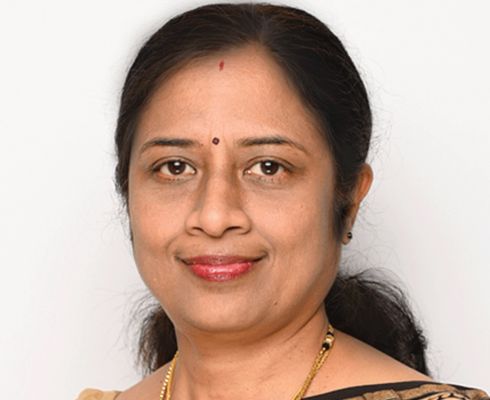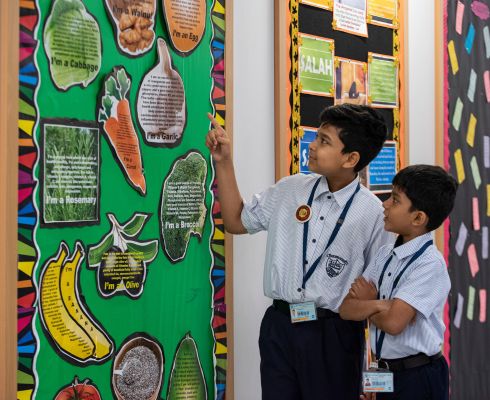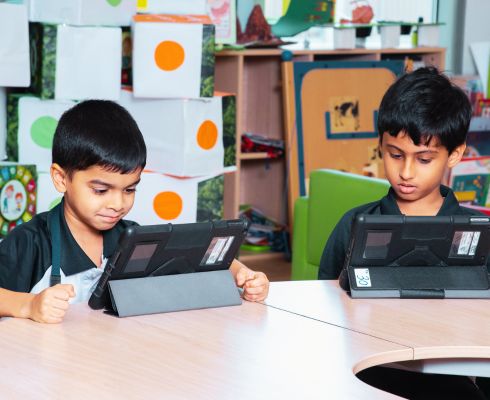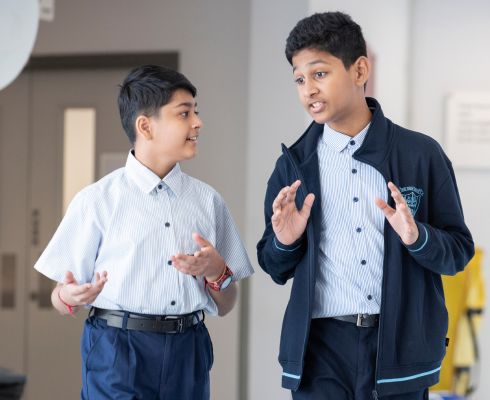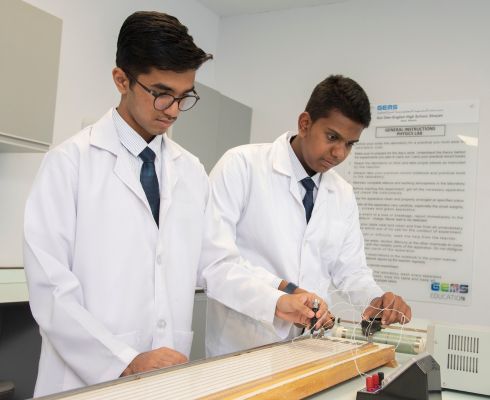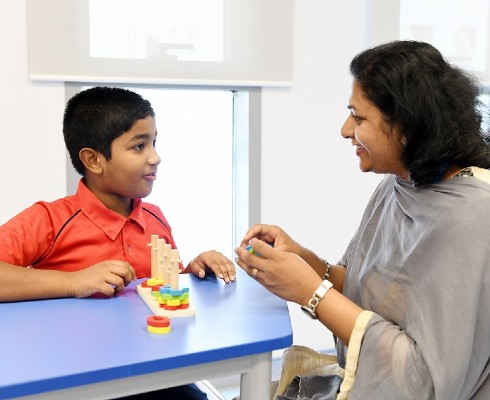Primary School
Welcome to the Primary Years at Our Own English High School Sharjah - Boys'
Our primary school curriculum is designed to provide young learners with a solid foundation in essential academic subjects, as well as fostering social, emotional, and physical development. It typically includes core subjects such as language arts, mathematics, science, UAE social studies, Arabic and a second language that could be either Hindi, French, Malayalam or Urdu which equip students with basic literacy, numeracy, scientific understanding, and an awareness of their community and the world.
Language Arts focuses on reading, writing, speaking, and listening skills, essential for communication and comprehension. Mathematics introduces fundamental concepts like arithmetic, geometry, measurement, and problem-solving. Science encourages curiosity and exploration of the natural world, covering topics from biology to basic physics and earth science. UAE Social Studies helps students understand their place in the world, learning about the history of the UAE and basic civics.
In addition to these core subjects, primary school curricula includes STEAM, art, music, physical education, and computing. These subjects contribute to a well-rounded education, enhancing creativity, physical fitness, technological literacy, and cultural awareness. A STEAM-integrated curriculum is an educational approach that integrates Science, Technology, Engineering, Arts, and Mathematics to foster interdisciplinary learning and creativity.
Teaching methods in primary education emphasize interactive and hands-on learning to engage young minds. Activities like group projects, field trips, and extracurricular clubs enrich the learning experience. Assessments are used to monitor progress and provide feedback, ensuring that students are meeting educational goals.
Overall, our primary school curriculum aims to create a supportive and stimulating environment that promotes academic growth, critical thinking, and the development of social and emotional skills.
Subject Overview
-
English
We believe that the learners’ needs are best served when they have opportunities to engage in learning within meaningful contexts. Our teachers plan learning experiences that enable learners to develop language within meaningful and enjoyable contexts, make connections, apply and transfer their learning to different situations.
This provides an authentic context for learners to develop and use language. Below are the Learning Objectives for Language Arts (English) under the strands of ‘Reading’, ‘Writing’, ‘Listening’ and ‘Speaking’.
Reading
We aim to produce students who can read easily, fluently and with understanding. We promote the development of the habit of reading widely and often, both for pleasure and to seek information. In Primary, we see the partnership between parents and school as a vital part of reading development. We have established an in-school reading programme for the students to achieve their full potential. To engage students further in reading, we also have a home reading programme that enhances their comprehension skills based on their Lexile levels.
We cater to different strands as under:
Individual Level Reading: Students read books, either silent reading or read aloud that are levelled according to the reading age of the individual. Students work their way through the levels, at their own rate, until they become fluent readers.
Whole Class Reading: Whole class reading is an integral part of English lessons and involves the student reading and discussing texts with the teacher and with each other. Whole class reading is often the stimulus for listening, speaking and writing activities. Throughout the year, students are exposed to works by significant children’s authors through their literature lessons in order to develop deep understanding and appreciation of themes and learning contexts.
Library Reading: Students access library, currently an e-library, and every week are able to borrow a wide variety of high-quality fiction and non-fiction texts. This is to encourage children to read widely in order to fuel their imagination, expose them to a wealth of language and literary heritage, and to encourage them to explore their learning in depth by seeking further information on topics of particular interest.
Writing
In order to write successfully, students must learn the rules of punctuation, sentence construction, spelling and grammar. At the initial stage of development, the writing will be in the form of the student’s own experience. As the students develop, they will be introduced to a variety of writing forms and will be confident writers who produce work in many different genres. All students write regularly as part of their English lessons, and are encouraged to work on becoming skilled writers who are able to plan, draft and edit their own work. They take part in regular vocabulary building sessions with interactive activities to enhance their writing. In addition to this, students also complete regular extended writing sessions where they develop their writing targets, and this allows teachers to closely monitor, assess and track writing progress.
Listening & Speaking
Listening & speaking both play an important part in vocabulary development. In order to express their thoughts clearly, students have to develop a wide-ranging vocabulary. Students are given many opportunities to develop their oracy skills through interesting and enjoyable role plays, performances, presentations and discussions. Our English lessons are designed to allow oracy, articulate answers and give opinions, giving reasons, ask relevant questions to find information, extend understanding, make predictions, express or describe something imaginary and explore an idea. We help to develop these skills using a variety of resources including digital technology.
-
Mathematics
At OOB, we see math as a way of thinking rather than a mere body of knowledge to be delivered. An exemplary primary math classroom consists of a very active and busy community of learners. Our approach to teaching and learning math reflects the idea that math will be fun, engaging for students. We use various apps to broaden the mathematical concepts. Themes such as an E- bazaar and setting up a bank further enhance the real-life application.
At school we use the ‘Math Mastery’ approach to ensure that content is not just ‘covered’ but that our students develop in-depth knowledge and practice skills in many different contexts. The Math Mastery approach is based on several key principles:
- Success for all: every child can enjoy and succeed in math as long as they are given the appropriate learning opportunities. A growth mindset enables pupils to develop resilience and confidence.
- Deeper understanding: Students must be given time and opportunities to fully explore mathematical concepts. The challenge comes from investigating ideas in new and complex ways – rather than accelerating through new topics.
- Problem-solving: Enabling learners to solve new problems in unfamiliar contexts is the ultimate aim of mathematics education. Identifying, applying and connecting ideas enable them to tackle new and more complex problems.
- Mathematical thinking: Successful mathematicians are known to develop mathematical ‘habits of mind’. To encourage this, we support our students to be systematic and seek out patterns. Questioning is a key element of this.
- Mathematical language: Mathematical language strengthens conceptual understanding by enabling students to explain and reason. This is carefully introduced and reinforced through frequent discussion to ensure it is meaningfully understood.
- Multiple representations: Objects, pictures, numbers and symbols enable learners to represent ideas and make connections in different ways. This develops understanding and problem-solving skills – while making lessons engaging and fun.
-
Environmental Science
Environmental science in primary involves helping students develop basic scientific ideas and understanding, which will enable them to explore and investigate their world. In well-planned, practical investigations students’ natural curiosity is channeled and they are equipped with the strategies and processes to develop scientific ideas and concepts. Various projects such as building a habitat diorama, creating an anemometer enhance the real-life application.
The development of ideas is central to our curriculum. The aims of our curriculum are to encourage and enable students to:
- develop an interest and curiosity about the world through the exploration and study of living and non-living things
- explore, develop and apply scientific ideas and concepts through hands on activities
- observe, ask questions, discern patterns, hypothesize, plan, experiment, design, make, measure, discuss, analyze and evaluate results and so develop a scientific approach to problem-solving
- comprehend the application of some basic scientific ideas and concepts in everyday situations
- comprehend the interdependence of a wide variety of living things and their environments, recognize the importance of conserving habitats and environments, and begin to understand that all life now and in the future depends on the sustainable development of the planet
- Interlink science with other subjects
-
Second Language (Hindi/French/Malayalam/Urdu)
The focus of our second language curriculum is fourfold:
- Semantic-related to understanding
- Phonetic- deals with the sound spelling and pronunciation
- Graphic- related to writing
- Phonetic-cum-graphic- dealing with reading
We ensure that our students are able to:
- enhance their vocabulary which enables them to communicate effectively and appropriately in real life situation
- comprehend proper grammatical structures
- express themselves creatively and imaginatively
-
UAE Social Studies
We follow the MOE Curriculum
Social studies which includes History, Geography, National Education and Economy covering aspects of citizenship, government, national identity, individual and society, national economy and Values and Ethics. As a crucial and compulsory part of UAE education it teaches students to be well informed, critically thinking citizens of their world.
The curriculum reinforces 21st century skills preparing students to contribute positively to the Fourth Industrial revolution along with ensuring the sustainability of the environment.
-
Arabic
We follow the Arabic B Ministry Curriculum
The students’ concept for Arabic language is an essential component of national and cultural identity. At the Primary level, we train our students with level wise reading, listening and writing with proper use of grammar and also train students to communicate in Arabic language.
-
Islamic Studies
We follow the MOE Curriculum
Students learn about the values of Islam which are based on the concepts of moderation, balance, tolerance, love, peace, cohesion, harmony, communal responsibility and respect for human dignity.
Islamic belief (Belief in angels & Fasting), Rulings & Aims, Values and Biographies
The science of Islamic education is based on the Al-Quran and Hadith so students are trained in The Holy Quran – Meaning and Translation/Tafseer of the Quranic Surahs.
Hadeeth – Meaning and translation of Prophet Muhammad’s (PBUH) sayings. Analyzing the Ahadeeth.
-
Moral Education Programme
In 2016, under the directives of His Highness Sheikh Mohammed bin Zayed Al Nahyan, Crown Prince of Abu Dhabi and Deputy Supreme Commander of the UAE Armed Forces, the Crown Prince’s Court launches Moral Education as a school curriculum subject, to promote tolerance and instill universal principles and values shared by humanity; in line with the UAE’s broadened vision of building a sustainable society, grounded in the happiness, wellness and social well-being of its people. The UAE is committed to developing responsible, cultured, engaged adults ready for society. The Moral Education program covers four pillars – Character and Morality; the Individual and the Community; Civic Studies; and Cultural Studies and blends academic content with an exploration of character and ethics. It is designed to develop young people of all ages in the UAE with universal principles and values that reflect the shared experiences of humanity.
-
Physical Education
Physical Education curriculum provides individual and team activities in a safe and supervised environment. Students of Primary learn skills of games, importance of conditioning and learn to follow rules and regulations that govern these games.
The Physical Education programme not only lays emphasis on physical and health aspects but also provides sufficient opportunities for socialization and learning of social values. Students learn to adjust well in society, and develop problem-solving skills. Thus, Physical Education prepares young students for a lifelong commitment to physical activity, health and well-being.
-
Art
The art curriculum is aimed to stimulate creativity and imagination and provide a basic understanding of the method. Students explore all the media to give expression to their ideas and create a variety of art work within a specific set of methodology. It focusses mainly on developing their drawing skill and learn material handling.
-
ICT
Information and technology is linked to the core subjects. Students use technology tools to find, explore, analyze, exchange and present information responsibly and creatively. Students navigate through an array of applications, use digital art and are taught how a digital system works.
-
STEAM
The STEAM curriculum is multidisciplinary where subject-integrated problem-based-reality lessons with hands-on projects are given to students to enhance their learning experience.
The purpose of STEAM curriculum is to enable the students to:
- use knowledge and skills from across the subjects to back up their work and have deeper understanding and recall of concepts when reminded of related activities
- develop an ability to recognize and respect their own and others’ varying skill sets and intelligences
- shift from ME (the singular student) to WE (an active participant in the global community)
-
Personal and Social Development
Personal and social education forms an integral part of the curriculum. At OOB we adopt a holistic approach with an emphasis on the development of students’ cognitive as well as affective domains. We encourage our students to be punctual to school with 100% attendance incentives and also provide well-groomed badges for a smart turn out.
Aims of Personal and Social Development:
- Personal health, hygiene and appearance
- Improving social competence
- Encourage positive attitude and values
- Understanding feelings and emotions
- Enhancement of self-esteem

